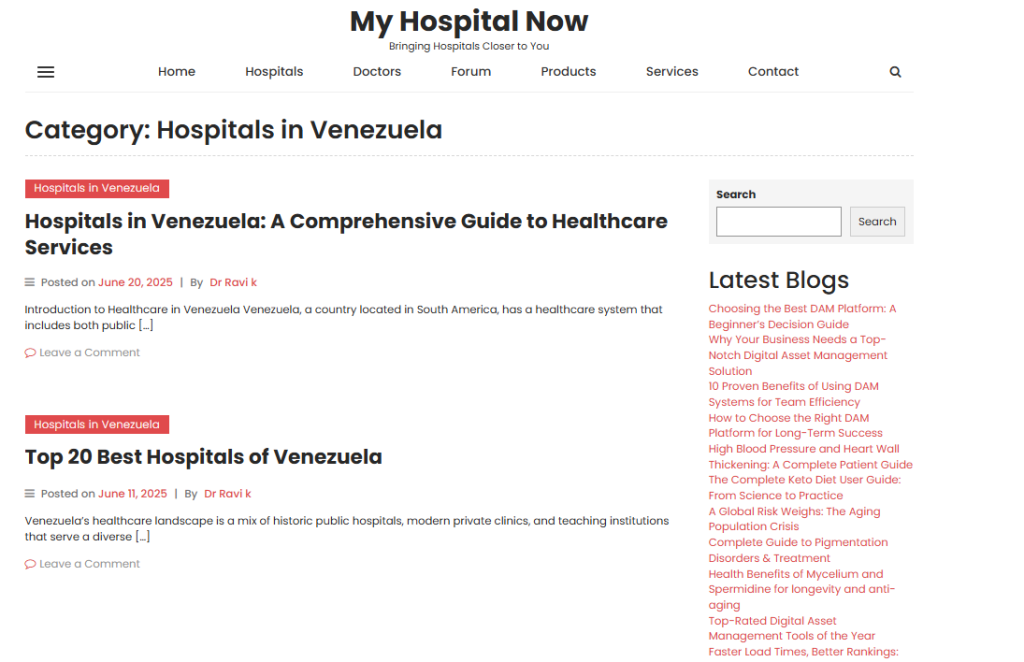
Venezuela’s health system is rooted in universal, state-provided care, but has struggled under economic crisis, shortages, and the ongoing humanitarian emergency of recent years. Public hospitals anchor the system, offering free or very low-cost care, but often face medicine, equipment, and staff shortages, especially outside major cities. Private hospitals offer a higher standard of comfort, sometimes more reliable access to supplies and specialists, but are costly (often requiring cash payments up front unless you have international/private insurance). NGOs, the Red Cross, and faith-based clinics now play vital roles across the country.
Start your preparation here:
Hospital Structure in Venezuela—Public, Private, and Humanitarian
1. Public Hospitals
- National Referral Hospitals in Caracas and major cities provide trauma, surgery, obstetrics, advanced diagnostics, and chronic disease management.
- State/Specialty & District Hospitals cover provinces and large towns with basic, general, and specialist care—maternity, surgery, pediatrics, infectious disease, mental health, and emergency departments.
- Services are free, but bring your own medicines and supplies, as essential items may not be consistently available.
2. Private Hospitals and Clinics
- Found mainly in Caracas, Maracaibo, Valencia, and larger urban areas.
- Offer shorter wait times, better facilities, and more available medications—require cash/credit card, insurance only with prior approval.
3. NGO & Faith-Based Facilities
- The Red Cross and church-sponsored health centers fill gaps, provide essential services, COVID-19 support, pediatric care, and medical emergencies for vulnerable groups and remote zones.
Navigating Your Hospital Journey in Venezuela
Step 1: Before You Need a Hospital
- Research facilities nearest your location on MyHospitalNow.
- Save numbers/locations for at least one public hospital, one private clinic, and the nearest Red Cross/NGO health service.
- Prepare a personal supply kit: essential medications, syringes, painkillers, antiseptics, hydration/electrolytes, documentation, and emergency contacts.
Step 2: Seeking Care
- For emergencies, public hospital ERs must stabilize and treat all patients. Be prepared for delays and possible supply/lab shortages.
- For planned specialist or surgical care, secure early appointments at trusted private clinics—verify insurance/payment options first.
- Bring all needed supplies—sometimes including sheets, food, and hygiene products—especially if seeking public care.
Step 3: Hospital Admission
- Present identification, payment or proof of insurance (for private), and your own medications/supplies. Check if interpreter/family advocate is needed.
- Demand written estimates for all services in private hospitals and keep all receipts.
Step 4: Aftercare and Follow-Up
- Discharge instructions are sometimes paper-based. Digitize/snap photos for records.
- Use NGO or private centers for ongoing rehabilitation, chronic disease monitoring, and access to international telemedicine networks if possible.
Major Hospitals and Regional Facilities
| Name | City/Region | Sector | Key Features / Challenges |
|---|---|---|---|
| Hospital Universitario de Caracas | Caracas | Public | National referral, surgery/ICU, trauma |
| Hospital de Niños JM de los Ríos | Caracas | Public | Pediatrics, specialty, research |
| Hospital Vargas | Caracas | Public | Surgery, trauma, emergencies |
| Centro Médico Docente La Trinidad | Caracas | Private | Surgery, ICU, advanced diagnostics |
| Clínica Metropolitana | Caracas | Private | Maternity, cardiac, ortho, ICU |
| Hospital Central de Maracaibo | Maracaibo | Public | Main regional, major trauma |
| Clínica Paraíso/La Sagrada Familia | Maracaibo | Private | General and specialty, better comfort |
| Red Cross (multiple) | Nationwide | NGO/faith | Maternal/child, emergencies, disaster |
Specialties, Access, and Patient Advice
- Emergency & Trauma: Major city hospitals and private/NGO options for urgent surgery; bring your own medical supplies.
- Surgery/Obstetrics: Prep early, confirm needs with staff, ensure outside support if possible.
- Pediatrics/Chronic Disease: Explore private/NGO or telehealth backup for long waits or supply issues in public.
- Mental Health: Available via NGOs and dedicated hospital units.
- Infectious Disease: COVID-19, malaria, yellow fever, and TB treatment prioritized for all patients—check protocols in advance.
Patient Voices—Real Experiences
- “Bringing all my supplies—including gloves, sutures, and antibiotics—was recommended for my appendectomy. The staff did their best, but shortages are real.”
- “As an expat, I used a private clinic—higher cost but immediate access, English-speaking doctor, and fully stocked lab.”
- “NGO clinic filled my son’s prescription and arranged emergency Red Cross care when meds weren’t available nearby.”
- “Important to keep cash—sometimes cards don’t work, and outside pharmacies may be the only source of meds.”
Checklist for Your Hospital Visit
- ☐ ID/passport, emergency contacts
- ☐ Cash, credit card, proof of insurance (for private)
- ☐ Personal supply kit: meds, bandages, antiseptics, gloves, soap, food, water, documents
- ☐ Written list of current health conditions, allergies, and prescriptions
- ☐ List of local hospitals/clinics, Red Cross center and NGO resources
- ☐ Emergency language aid/interpreter if needed
Frequently Asked Questions
Are all hospitals public and free?
Public hospitals are free, but under severe strain—patients must bring many supplies. Private hospitals offer better access but at high cost.
Can expats or foreign visitors get care?
Yes, but payment is required for private care, and most insurance must be approved before admission.
Are digital health or telemedicine available?
In a limited way, mostly in urban/private settings or through humanitarian organizations.
Using MyHospitalNow in Venezuela
- Go to Hospitals in Venezuela category for reliable facility listings, user reviews, practical prep, and survival checklists.
- Download resources and planning tools for chronic care, emergencies, or medical travel within and outside Venezuela.
Start Your Venezuela Hospital Journey
From surgery in Caracas to emergency support in remote regions, Venezuela’s hospitals face unique challenges—but with research, prep, and the right guidance, families and expats can access safer care. MyHospitalNow offers the latest info, prep strategies, provider contacts, and trusted local advice.
- Start at the homepage
- Plan with regional details and tips at Hospitals in Venezuela category
Your health and safety come first—compare, plan, and succeed in Venezuela’s hospital system with MyHospitalNow.